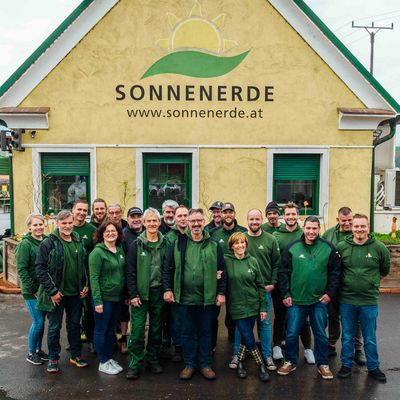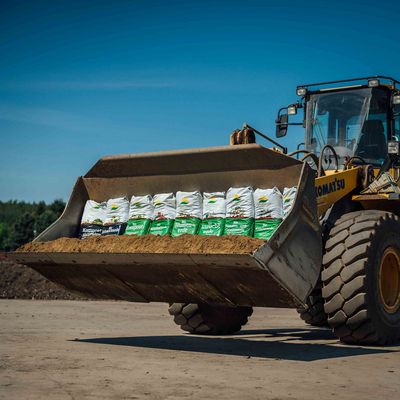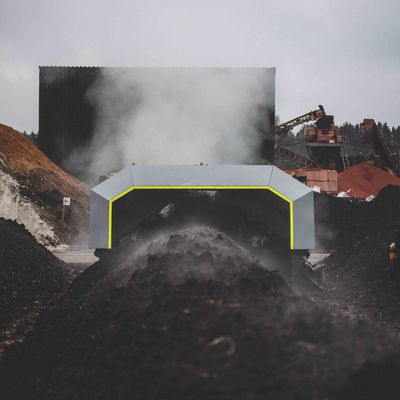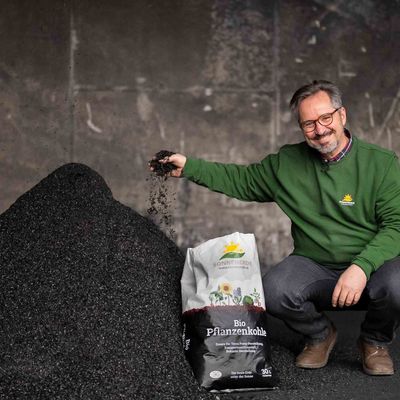





The project aims to demonstrate the production of plant-based biochar in the compost cycle and its development to high value-added biochar products.
Biochar is produced with the pyrolysis technology, which captures and stores the carbon of bio-waste, which normally would be part of the greenhouse gases of carbon dioxide (CO2) emissions.
However, today biochar is still a niche market and with current technologies it is not possible to produce biochar in large quantities and cheap enough to bring it to the market.
The composting facility Sonnenerde in Riedlingsdorf (Burgenland, Austria) with extensive biochar research experience, jointly developed with the partner NGE an innovative circular concept perfectly integrated into the composting cycle.
The key innovation is “PyroDry”, a new drying and pyrolysis technology by the Austrian partner NGE. Hereby the screening residues from the bio-waste will be carbonised and biochar as a new raw material will be obtained.
Together with the German partner CARSTORCON, the project will develop new climate-positive building material additives based on the biochar produced. Biochar of the highest quality produced forms the raw material for aggregates in the concrete and asphalt industries. The building material additive made from Biochar improves the concrete properties and also has a positive effect on the climate by storing carbon in the building materials.
Further high value-added biochar products will be developed together with Sonnenerde’s affiliated entity Charline. Biochar can be mixed with compost for Terra Preta Soil and Soil activator, or as Feedchar (dog, cat, horse). Also for the agriculture sector, biochar can be used as nitrogen fertilizer or manure amendment.
European Municipalities and Cities can use biochar as fine substrate for a new tree planting system to adapt to climate change.
Finally, the transnational project consortium will disseminate and communicate the results regularly and develop a blueprint for EU wide dissemination, replication and scale up.
Biochar is obtained from bio-waste, which is produced with the “pyrolysis” technology. The pyrolysis is a small reactor for thermo-chemical treatment, whereby the organic substances are broken down in a very low-oxygen process at temperatures ranging from 350°C to 700 °C. This superheating with lack of oxygen is the key technology to ensure that the carbon content can be captured and not be burned to ash and be lost. Thus the pyrolysis treatment is preventing combustion and produces biochar with a very high content of up to 85 % of very stable carbon.
Thanks to this pyrolysis heating technology and process, carbon is stored in biochar and achieves the known effect of ‘terra preta’, (Portuguese for ‘dark soil’), where the carbon can persist for hundreds to thousand years. Biochar thus stores carbon ultimately, which would be normally part of the greenhouse gas of carbon dioxide (CO2) and is captured by plants through photosynthesis.
As the industrial world is emitting too much CO2 and the nature can not balance out the emission, carbon removal technologies are in addition to the reduction of emissions, absolutely necessary to reach the climate goals. The Biochar innovation thus functions as a unique carbon sink technology, which can effectively store carbon.
Bio-waste treatment sector:
Municipal bio-waste (vegetal green waste) is separately collected and processed by composting facilities. On average, each facility treats 10,000 tons per year of bio-waste. Today only around 17% of bio-waste is collected and treated in the EU (with a huge regional diversity), but the target is to recycle 65% of municipal waste by 2035 in the entire EU.
Compost plays a crucial role in improvement of the structure of the soil. It allows more air into the soil, improves drainage and reduces erosion. Compost helps to stop the soil from drying out in times of drought by holding more water. The transformation of biologically derived waste streams into compost is one of the key pillars of Europe’s Circular Economy strategy and plays a vital role in carbon farming.
Composting Process:
Composting process itself is complex. Composting is a biological process that occurs mostly under aerobic conditions and the presence of oxygen. The preparation of an ideal compost and within short period of time needs to keep all the factors affecting compost preparation in ideal range. The challenge is that the deterioration process requires time and a well screened feedstock is absolutely necessary.
Today the environmental problem is that the screening residues not treated and shall normally be incinerated, causing costs and GHG emissions. The amount of screening residues is substantial and became a real problem for the composting facilities. In each treatment processes the exact amount differs. In composting facilities with household bio-waste from gardens, the screening residues are up to 25% that can not be treated.
The Biochar-LIFE innovation solves several challenges:
Composting facilities are able use the entire screening rest of organic waste as feedstock for the pyrolysis, so that the problem of incinerating screening residues are completely solved. PyroDry uses also the excess heat during the process in such a way, that the entire pyrolysis operation becomes energy self-sufficient and that another waste stream of wet industrial sludge can be dried and solved.
The transnational project consortium designed a work plan, that foresees a prototype demonstration system in operational environment, which shall be able to convert yearly ca 5,300 tons of wet bio-waste into 1,000 tons of biochar (Work Package WP2).
Once biochar obtained, the project plans to develop climate positive concrete amendment (WP3) and develop and exploit further high value-added biochar products in a wide range of sectors (WP4).
The project demonstration will form part of a blueprint for EU wide dissemination, replication and scale up (WP4,WP5).
The circular innovation will lead to a more cost effective production of biochar, while substantially reduce the CO2 emissions. On top, the obtained biochar is the ‘magic bullet’ to mitigate climate change. With 1,000 tons of biochar, we can store around 2,500 tons of CO2 in high value-added biochar products for century.
The project consortium is transnational and consists of five partners from Austria, Germany and Belgium. Each of them is bringing the necessary complementary expertise to implement the work plan and achieve the goal of the LIFE programme.
Sonnenerde GmbH is a composting facility in Austria (Burgenland) and was founded by Gerald Dunst in 1998, situated in Oberwarter Straße 100, AT-7422 Riedlingsdorf.
CharLine GmbH (short CharLine) is a subsidiary from Sonnenerde. The company was founded in January 2016 with the only focus on looking on biochar as a feedstock and creating ready to use biochar-based products.
Next Generation Elements GmbH (NGE) is a Next Generation Group company based in Feldkirchen/Danube, Austria. Since 2017, the company's core expertise has been in the construction of customised pyrolysis plants for the utilisation of biogenic residues. As part of Next Generation Holding, it is a solution provider in the field of alternative thermal treatment technology and focuses on consulting, development and realisation of fully automated system concepts.
We at CarStorCon Technologies GmbH transform concrete and asphalt into CO2 sinks and improve the material properties of the products at the same time. Our start-up from Marienhafe has developed an aggregate that actively removes CO2 from the atmosphere and permanently binds it in building materials. The aggregate is based on technical carbon, which is obtained from regional biogenic waste streams. The storage and incorporation of technical carbon is a recognized negative emissions technology. In this way, we create recognized, sustainable and permanent carbon sinks in concrete and asphalt applications. The use of the Clim@Add® aggregate also makes it possible to save on resource-intensive primary raw materials such as cement.
Pastu Green is an environmental consultancy firm, exploiting the development of innovative ecological friendly products and business solutions that decrease the environmental impact and use less resources. PASTU is mostly active in the business areas of transport, logistics and climate change. The company is based in Brussels and consists of a dynamic experienced senior team with a proven quality of services of more than 20 years. PASTU also supports ecological and sustainable projects in the scale up development and exploitation across Europe.
You can get in touch with the project by eMail: biochar@green.pastu.eu
The Biochar Action is co-funded by the Programme for the Environment and Climate Action (LIFE); Project 101146413 / LIFE23-ENV-AT-BIOCHAR-LIFE
Durch die hervorragende Unterstützung der Wirtschaftsagentur Burgenland GmbH haben wir es geschafft, für unsere Erweiterung "Betriebserweiterung Riedlingsdorf"…
Mehr erfahren